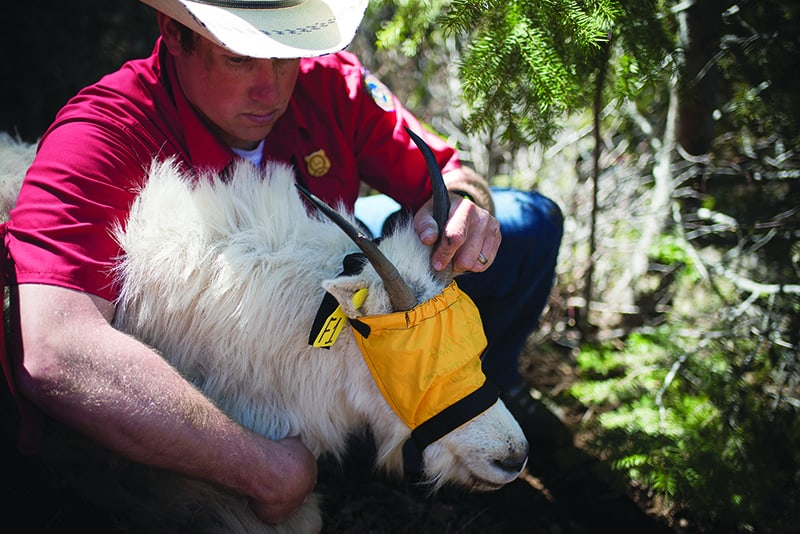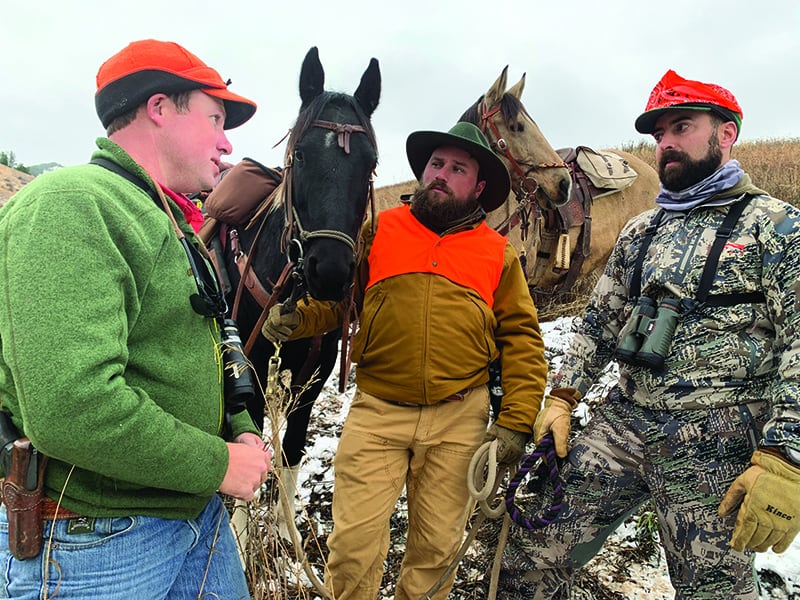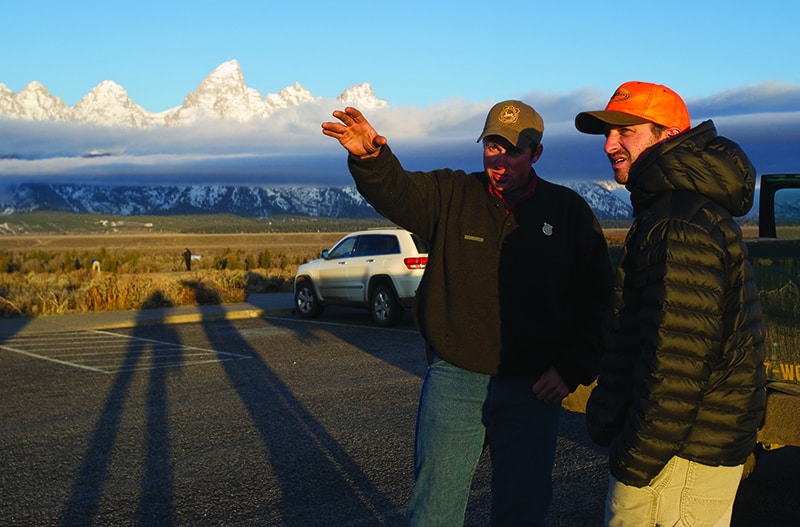Read The
Current Issue
The Warden Life
A warden for the Jackson Region of the Wyoming Game and Fish Department logs long hours and has a job description that extends well beyond checking hunting tags and fishing licenses.
By Mike Koshmrl

Game Warden Kyle Lash checks totals after finishing a count of elk on the National Elk Refuge’s Nowlin feedground. Photo by Ryan Dorgan
ONCE AGAIN, KYLE Lash is roused from relaxation—pulled away from his wife, two young children, and the comfort of his East Jackson home—by an after-hours call from work. It’s a weekday evening in March and the Wyoming Game and Fish Department warden has a persistent hack and a cold, but he’s been alerted that a decoy elk antler is on the move out by the Horsethief Canyon trash transfer station south of Jackson.
The slope where Game and Fish left this antler a couple of weeks earlier is seasonally closed to humans to protect wintering elk and mule deer. So, whomever picked up the decoy, which is embedded with a chip, is poaching. Two springs before, Lash had given chase after an antler poacher in the same gulch, but the scofflaw turned off their headlamp and went “pitch black” under the guise of darkness. Lash was unable to find them.
Fast-forward two years, and Lash is motivated. There’s no chance he’ll pass on an opportunity to nab a poacher on the same slope again. “Honestly, it gets addicting,” Lash says. He’s motivated not only by the adrenalin of making the case, but also by the noble task at hand: bringing justice to one committing crimes against wildlife. His love of his profession, which often overlaps with his personal outdoor interests, is also because the work can be enjoyable. “To be honest with you, sometimes this job is so much fun,” he says.
An unprecedented interest in antler hunting has created a new breed of poacher that occupies much of the Jackson game wardens’ time.
A 33-YEAR-old who grew up in Thermopolis, Wyoming, Lash is seven years into his stint as the Game and Fish’s staff warden for the south half of the Jackson Region; Jon Stephens is his counterpart covering the region’s north half. Depending on the time of year, their duties vary wildly—although they’re cyclical, usually predictable, and always demanding. “I don’t know if there’s ever really a ‘down’ time of year,” Lash says. In the heart of winter, the main tasks are policing late season bison and elk hunts, monitoring and checking trap lines and ice fishermen, and responding to wildlife calls, like stubborn moose bedded in driveways. Spring was once a slow time of year, but nowadays an unprecedented interest in antler hunting—collecting the valuable pointy protuberances that annually fall or “shed” off bull elk and buck deer—has created a new breed of poacher that occupies much of the Jackson game wardens’ time. Summer duties are often fishing-related, checking licenses and angler creels, and also taking a bear conflict call now and then. By August, Lash is prepping for the busiest time of year: the general rifle season fall hunts, which stretch from September through the end of October.
There are always unpredictable tasks thrown into the mix, partially a product of working out of an office with just 16 full-time employees. “When you have a small agency,” Lash says, “everybody has to help each other out.” Go back to February 8, 2019, and Lash spent his morning on a snowmobile, herding bison south from Grand Teton National Park (GTNP) toward the National Elk Refuge. About 100 animals had become stranded by deep snow near the Moosehead Ranch, and they weren’t getting along with the guest ranch’s resident herd of horses. After bison had gored several of the horses, GTNP and Game and Fish—Lash included—teamed up to escort the herd south using snowmachines. The park even closed the highway to cars for the morning so the herders and bison could utilize the path of least resistance.
The routine and unplanned outings—plus some office and courtroom time here or there—all add up. Each fall, Lash, whose prior warden job had him stationed in the agricultural community of Kaycee, Wyoming, a small town between Casper and Sheridan, puts in the maximum number of hours the state allows: 259 hours a month, or about 65 hours a week. As a salaried employee, there isn’t overtime pay (although Lash, and all Wyoming Game and Fish game wardens, are provided housing as part of their job). “Basically, you’ve got to work the hours to get the job done—[however many] that might be,” he says. “We have to code our hours, and I even try to code it out down to the species. If I’m out checking duck hunters, I’m coding for waterfowl.” The long weeks are easier to endure because of the flexibility inherent in the job. “The lucky part about it is I can throw my dog in with me,” he says, “and my wife can ride along.” Now with two young kids, such ridealongs don’t happen that often, but Lash says that pre-kids they were frequent.
One caricature of a game warden is someone who’s creeping around checking out hunters and anglers through binoculars, eager for the chance to thumb through their ticket pad to cite any noncompliance. Stealth operations and straightforward policing are no doubt part of the job, but just as often Lash is in the field simply helping people out. On one recent late October morning, he trudged through thick, matted grass along the bottom of the Horse Creek elk feed ground south of Jackson, toward two horseback elk hunters. Arriving, he told the men, local residents Ryan Fillpot and Steven Babbitt, about a nearby area where a couple of days prior he had seen a wad of elk. A few minutes later, he trekked back toward his green pickup truck and the hunters’ horses walked away in the direction Lash had indicated—though not before he had checked the men’s licenses.
Lash’s first task that same morning was to check out some animal carcasses that a pedestrian along Henry’s Road had called in. Being hilly country near the Snake River, it was an odd place for pronghorn, but, at 8:53 a.m., that’s just what the warden found off the shoulder. He suspected the remains were legally discarded by a hunter. Just to be sure, Lash eased down a steep hillside to the floodplain to investigate and make sure all the legally required cuts of meat were retrieved. Because it was such a small buck, Lash wondered if it wasn’t a miss-identified doe. Combing nearby cottonwoods, he found three more pronghorn rib cages before calling it good.
BACKTRACKING THE decoy antler above the trash transfer station, Lash loses his suspect. This time, instead of giving chase, he waits for the suspect to come to him. A game warden who came up from Star Valley, Cody Schoonover, trails a car leaving the trash transfer station property while Lash keeps his eyes on the site. Schoonover is not following the right car. While he is diverted inspecting it, another vehicle, possibly carrying the poached decoy antler, drives away. “I’m angry, more than anything,” Lash says, after realizing the antler poacher got away.
Before Lash has a chance to make it home, another call comes in that he responds to: a nuisance moose that’s bedded on a sidewalk in a residential area off Teton Village Road and won’t move. It’s a difficult winter with a historically deep spring snowpack still covering the valley floor, and the warden has an obvious soft spot for the animals. He knows they’re worn down and barely able to move through the deep snow that’s everywhere except on plowed parking lots, roads, and sidewalks. Arriving at a building of condominiums, Lash quickly locates the moose, a cow, and finds there’s also a calf. “C’mon now, girls,” he says, confidently walking at the weary ungulates and nudging them away from the sidewalk. After a moment of hesitation, the two moose high-leg it away. It’s not catching a poacher, but it’s another routine, and rewarding, part of a Jackson Hole game warden’s life. JH
What Happened to the Antler Poacher?
Lash suspected one of the temporary contractors working at the old landfill was the culprit and leaned on the business owner to check in with his employees. When the employer did so, Bliss, Idaho, resident Robert Halligan, 44 at the time, confessed.
Appearing before Ninth Circuit Court Judge James Radda on May 10, 2019, Halligan pled guilty to two antler-gathering violations on March 25 and another two violations that occurred two days later. All were elk antlers he picked off the Horsethief Canyon hills after wrapping up his day’s work.
Halligan apologized and said he didn’t know the area was closed to humans in the winter.
Prosecuting attorney Zane Aukee pointed out that Halligan had been convicted of 17 wildlife violations in Idaho last year alone. Aukee charged that Halligan had a “total disregard” for Wyoming and Idaho’s wildlife regulations, and asked for a sentence that included jail time. Radda obliged, and Halligan, looking stunned, was escorted away by a police officer. He spent ten days in the Teton County Jail.

Kyle Lash holds a sedated mountain goat as samples are gathered during a capture and collar operation near Alpine. Photo by Bradly J. Boner

As a game warden, Kyle Lash doesn’t just check licenses. Here he talks with local elk hunters about where he saw a group of elk moving a few days earlier. Photo by MIKE Koshmrl

Lash talks to Brian Caskey as Caskey decides where to begin his elk hunt in Grand Teton National Park. Photo by Price Chambers




